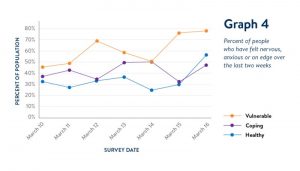By Thea Garon, Senior Director and Andrew Dunn, Manager, Financial Health Network
The COVID-19 pandemic and its economic fallout are likely to have the largest impact on those who are already struggling financially. Survey data from the University of Southern California and the U.S. Financial Health Pulse show that Financially Vulnerable Americans believe they are most likely to bear the brunt of the crisis in the coming months, with these concerns increasing over the course of one crucial week in March when the reality of the pandemic’s impact on the economy became real for most Americans. (For more on the study methodology, please see note at the end of this blog post.)
Likelihood of Job Loss Is Rising, with the Financially Vulnerable Most at Risk
Financially Vulnerable Americans are most likely to believe they are at risk of losing their job in the next three months. As of March 16, when awareness of the economic fallout started to rise but before jobless numbers started to increase dramatically, Financially Vulnerable survey respondents collectively believed there was a 25% chance they would lose their jobs within the next three months (far higher than the 14% chance cited by Financially Healthy and Financially Coping survey respondents). This figure increased fivefold from the start of the study period on March 10.
 Notes: This graph displays the average of survey respondents’ answers to the question, “What is the percent chance that you will lose your job because of the coronavirus within the next three months?” Data is organized by the day respondents took the survey and by financial health tier as calculated by respondents’ answers to financial health questions from the 2019 U.S. Financial Health Pulse survey. Survey data were weighted on a daily basis to be nationally representative.
Notes: This graph displays the average of survey respondents’ answers to the question, “What is the percent chance that you will lose your job because of the coronavirus within the next three months?” Data is organized by the day respondents took the survey and by financial health tier as calculated by respondents’ answers to financial health questions from the 2019 U.S. Financial Health Pulse survey. Survey data were weighted on a daily basis to be nationally representative.
Financially Vulnerable are Most Likely to Run Out of Money within 3 Months
Financially Vulnerable Americans are more likely than Financially Healthy and Financially Coping Americans to think their money will run out in the next few months. As of March 16, Financially Vulnerable respondents said there was a 45% chance they would run out of money in the next three months as a result of the coronavirus. This was more than twice the figure cited by Financially Coping respondents and more than 10 times the figure cited by Financially Healthy respondents.
 Notes: This graph displays the average of respondents’ answers to the question, “What is the percent chance you will run out of money because of the coronavirus in the next three months?” Data is organized by the day respondents took the survey and by financial health tier as calculated by respondents’ answers to financial health questions from the 2019 U.S. Financial Health Pulse survey. Survey data were weighted on a daily basis to be nationally representative.
Notes: This graph displays the average of respondents’ answers to the question, “What is the percent chance you will run out of money because of the coronavirus in the next three months?” Data is organized by the day respondents took the survey and by financial health tier as calculated by respondents’ answers to financial health questions from the 2019 U.S. Financial Health Pulse survey. Survey data were weighted on a daily basis to be nationally representative.
Fears of Getting Sick Are Increasing Fastest Among the Financially Vulnerable
By the end of the study period, Financially Vulnerable respondents reported a higher likelihood that they would get sick from the coronavirus. These figures rose most rapidly between March 14 and March 16, increasing from roughly 14% to nearly 34%. Given that Financially Vulnerable Americans are more likely to work in jobs without the option of remote work — 30% of Vulnerable respondents said they had the option to work from home, compared with 50% of Healthy respondents — these individuals may feel they have no choice but to keep showing up for work, even if that increases their exposure to the virus.
 Notes: This graph displays the average of respondents’ answers to the question, “On a scale of 0 to 100 percent, what is the chance that you will get the coronavirus in the next three months? If you’re not sure, please give your best guess.” Data is organized by the day respondents took the survey and by financial health tier as calculated by respondents’ answers to financial health questions from the 2019 U.S. Financial Health Pulse survey. Survey data were weighted on a daily basis to be nationally representative.
Notes: This graph displays the average of respondents’ answers to the question, “On a scale of 0 to 100 percent, what is the chance that you will get the coronavirus in the next three months? If you’re not sure, please give your best guess.” Data is organized by the day respondents took the survey and by financial health tier as calculated by respondents’ answers to financial health questions from the 2019 U.S. Financial Health Pulse survey. Survey data were weighted on a daily basis to be nationally representative.
Anxiety Is High Among All Americans, but Highest Among the Financially Vulnerable
While anxiety is high across the country, Financially Vulnerable Americans report the most anxiety due to the coronavirus. As of March 16, nearly 80% of Financially Vulnerable survey respondents said they felt some anxiety over the last two weeks. These sentiments were consistently higher for the Financially Vulnerable than the Financially Healthy and Coping over the course of the survey period.
 Notes: This graph displays the percentage of respondents who indicated they experienced some anxiety in response to the question, “Over the last two weeks, how often have you been bothered by any of the following problems? (Feeling nervous, anxious, or on edge).” Data is organized by the day respondents took the survey and by financial health tier as calculated by respondents’ answers to financial health questions from the 2019 U.S. Financial Health Pulse survey. Survey data were weighted on a daily basis to be nationally representative.
Notes: This graph displays the percentage of respondents who indicated they experienced some anxiety in response to the question, “Over the last two weeks, how often have you been bothered by any of the following problems? (Feeling nervous, anxious, or on edge).” Data is organized by the day respondents took the survey and by financial health tier as calculated by respondents’ answers to financial health questions from the 2019 U.S. Financial Health Pulse survey. Survey data were weighted on a daily basis to be nationally representative.
These graphs show how the economic and health fallout from the coronavirus pandemic is disproportionately affecting those who are already struggling financially. Providing assistance to those in need will require the collective action of the entire financial health ecosystem and a relentless focus on solutions designed to offer relief to those who need it most. For example, financial services providers can help their customers by proactively monitoring their financial health and deploying high-quality solutions to address their needs. Employers can help their employees by offering benefits and compensation that help them weather this period of extreme uncertainty. Policymakers can ensure that all people can access their stimulus payments in a timely and affordable manner.
To help industry leaders respond, the Financial Health Network will be sharing further insights through surveys and financial data that shed light on how the ongoing crisis is affecting the financial health of people across America. Please visit our COVID-19 response page for the latest research, insights, and solutions.
This brief draws upon data from a survey fielded from March 10–16 to members of the Understanding America Study (UAS) panel maintained by the Center for Economic and Social Research at the University of Southern California (n = 3,926). To determine survey respondents’ financial health tiers, we merged data from this survey with data from the 2019 U.S. Financial Health Pulse survey (fielded to the UAS panel from April to June 2019).
We used the FinHealth Score™ measurement framework to assess financial health tiers of survey respondents: Individuals with a FinHealth Score from 79–100 are considered Financially Healthy; they are spending, saving, borrowing, and planning in ways that will allow them to be resilient and seize opportunities over time. Individuals with a FinHealth Score from 40–79 are considered Financially Coping; they are struggling with some, but not necessarily all, aspects of their financial health. Individuals with a FinHealth Score from 0–39 are considered Financially Vulnerable; they are struggling with most, if not all, aspects of their financial health. According to the U.S. Financial Health Pulse, 29% of Americans were Financially Healthy in 2019, 54% were Financially Coping, and 17% were Financially Vulnerable.


